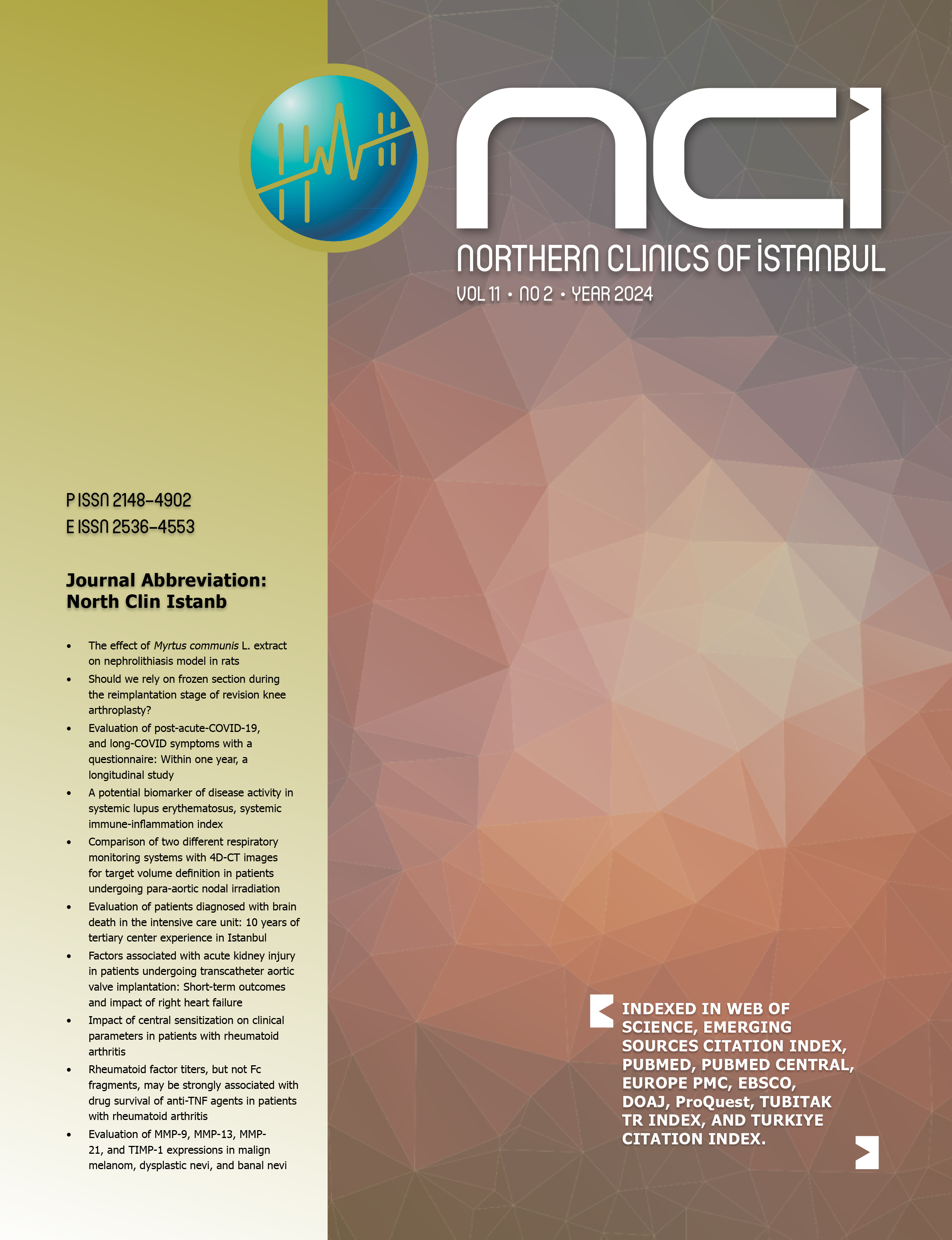The association between aspirin resistance and extent and severity of coronary atherosclerosis
Serkan Kahraman1, Ali Dogan2, Murat Ziyrek1, Emrah Usta3, Onder Demiroz4, Cavlan Ciftci41Department of Cardiology, Istanbul Silivri State Hospital, Istanbul, Turkey2Department of Cardiology, Istanbul Yeniyuzyil University Faculty of Medicine, Gaziosmanpasa Hospital, Istanbul, Turkey
3Department of Cardiology, Baltalimani Training and Research Hospital, Istanbul, Turkey
4Department of Cardiology, Istanbul Bilim University Faculty of Medicine, Istanbul, Turkey
INTRODUCTION: Uncontrolled inflammatory responses could contribute to the pathogenesis of many leading causes of human morbidity and mortality. Aspirin is an anti-inflammatory and antithrombotic drug that is used in the primary and secondary protection in atherothrombotic diseases and complications. The aim of the present study was to analyze the effect of aspirin resistance on the extent and severity of atherosclerosis.
METHODS: One hundred patients who underwent coronary angiography with suspected or known coronary artery disease and were using aspirin were enrolled in the study.
RESULTS: Of these 100 patients, 30 (8 female and 22 male) formed the aspirin-resistant group (ARG), and 70 (22 female and 48 male) formed the control group. Gensini scoring system (GSS) was significantly higher in the ARG than in the control group (80.5 (36166) vs. 45 (2209); p<0.001). The number of percutaneous coronary intervention (PCI) patients was significantly higher in the ARG (13 of 30 (43.3%) ARG vs. 13 of 70 (18.6%) control group; p=0.01). Furthermore, when we evaluate the 16 reintervention patients, stent restenosis was significantly higher in the ARG (11 of 16 (68.75%) ARG vs. 5 of 16 (31.25%) control group; p=0.016). Multivariate logistic regression analysis revealed that GSS (p=0.038; 95% CI: 1.0011.026) and PCI history (p=0.017; 95% CI: 1.18289.804) were independent risk factors for aspirin resistance.
DISCUSSION AND CONCLUSION: In conclusion, atherosclerotic burden as calculated by the GSS is significantly higher in aspirin-resistant patients. According to this result, we suggest that aspirin treatment can be prescribed in higher doses in aspirin resistance patients with coronary events. Furthermore, GSS and PCI history could be independent predictors of aspirin resistance.
Keywords: Aspirin resistance, atherosclerosis; coronary artery disease.
Aspirin Direnci ile Koroner Ateroskleroz Yayginlik ve Şiddeti Arasindaki İlişki
Serkan Kahraman1, Ali Dogan2, Murat Ziyrek1, Emrah Usta3, Onder Demiroz4, Cavlan Ciftci41Istanbul Silivri Devlet Hastanesi, Kardiyoloji Klinigi, Istanbul, Turkiye2Istanbul Yeniyuzyil Universitesi Gaziosmanpasa Hastanesi Tip Fakultesi, Kardiyoloji Ana Bilim Dali, Istanbul, Turkiye
3Baltalimani Egitim ve Arastirma Hastanesi, Kardiyoloji Klinigi, Istanbul, Turkiye
4Istanbul Bilim Universitesi Tip Fakultesi, Kardiyoloji Ana Bilim Dali, Istanbul, Turkiye
GİRİŞ ve AMAÇ: Kontrolsüz inflamatuar yanıt insan morbidite ve mortalitesine etkili birçok etkenin patogenetik mekanizmasına katkıda bulunmaktadır. Aspirin aterosklerotik hastalık ve komplikasyonlarının primer ve sekonder korunmasında etkili antiinflamatuar ve antitrombotik bir ilaçtır. Çalışmamızın amacı aspirin direncinin koroner aterosklertotik hastalık yaygınlığı ve şiddeti üzerine etkisini incelemektir.
YÖNTEM ve GEREÇLER: Çalışmamıza aspirin kullanan ve bilinen veya şüphe edilen koroner arter hastalığı olup koroner anjiyografisi uygulanan 100 hasta dahil edildi.
BULGULAR: 100 hastanın 30u (8 kadın, 22 erkek) aspirin dirençli grup (ADG) ve 70i (22 kadın, 48 erkek) kontrol grubunu oluşturmaktadır. Gensini skorlama sistemi (GSS) ADGde daha yüksek saptanmıştır (80,5 (36-166) karşı 45 (2-209); p<0,001). Perkütan koroner girişim (PKG) ADG de daha fazladır [30 hastada 13 (%43,3) ADGde, 70 hastada 13 (%18,6) kontrol grupta; p=0,01]. PKG yapılan 16 hasta üzerinden stent restenozu ADGde daha yüksek bulunmuştur (16 hastada 11 (%68,75) ADGda, 16 hastada 5 (%31,25) kontrol grupta; p=0,016). Çoklu değişkenli regresyon analizine göre GSS (p=0,038; %95 CI: 1,001-1,026) ve PKG öyküsü (p=0,017; %95 CI: 1,182-89,804) aspirin direnci için bağımsız risk faktörleridir.
TARTIŞMA ve SONUÇ: Çalışmamızda GSS ile hesaplanan aterosklerotik yükün aspirin direnci olan hastalarda daha yüksek olduğu saptanmıştır. Bu sonuca göre aspirin direnci olanlarda koroner olay varlığında daha yüksek dozlarda aspirin tedavisi verilebileceğini önermekteyiz. Ayrıca GSS ve PKG öyküsü aspirin direnci için bağımsız risk faktörleridir.
Anahtar Kelimeler: aspirin direnci, ateroskleroz, koroner arter hastalığı
Manuscript Language: English





















